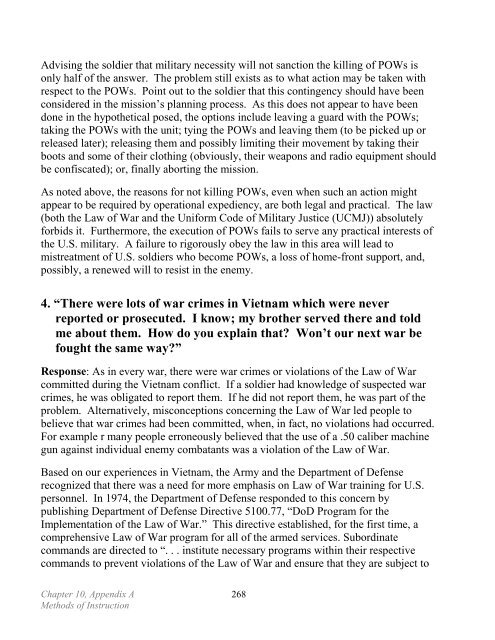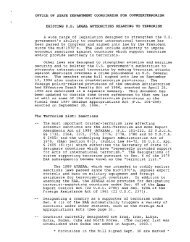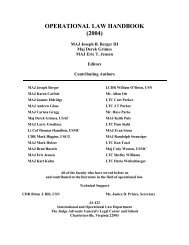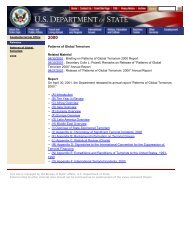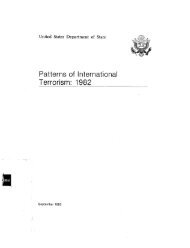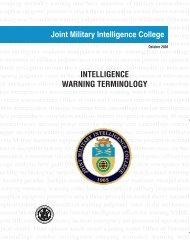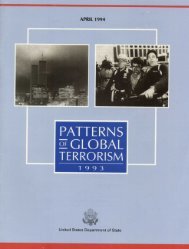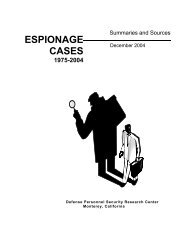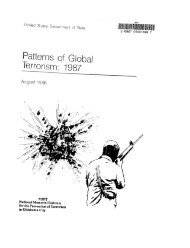Law of War Workshop Deskbook - Higgins Counterterrorism ...
Law of War Workshop Deskbook - Higgins Counterterrorism ...
Law of War Workshop Deskbook - Higgins Counterterrorism ...
Create successful ePaper yourself
Turn your PDF publications into a flip-book with our unique Google optimized e-Paper software.
Advising the soldier that military necessity will not sanction the killing <strong>of</strong> POWs isonly half <strong>of</strong> the answer. The problem still exists as to what action may be taken withrespect to the POWs. Point out to the soldier that this contingency should have beenconsidered in the mission’s planning process. As this does not appear to have beendone in the hypothetical posed, the options include leaving a guard with the POWs;taking the POWs with the unit; tying the POWs and leaving them (to be picked up orreleased later); releasing them and possibly limiting their movement by taking theirboots and some <strong>of</strong> their clothing (obviously, their weapons and radio equipment shouldbe confiscated); or, finally aborting the mission.As noted above, the reasons for not killing POWs, even when such an action mightappear to be required by operational expediency, are both legal and practical. The law(both the <strong>Law</strong> <strong>of</strong> <strong>War</strong> and the Uniform Code <strong>of</strong> Military Justice (UCMJ)) absolutelyforbids it. Furthermore, the execution <strong>of</strong> POWs fails to serve any practical interests <strong>of</strong>the U.S. military. A failure to rigorously obey the law in this area will lead tomistreatment <strong>of</strong> U.S. soldiers who become POWs, a loss <strong>of</strong> home-front support, and,possibly, a renewed will to resist in the enemy.4. “There were lots <strong>of</strong> war crimes in Vietnam which were neverreported or prosecuted. I know; my brother served there and toldme about them. How do you explain that? Won’t our next war befought the same way?”Response: As in every war, there were war crimes or violations <strong>of</strong> the <strong>Law</strong> <strong>of</strong> <strong>War</strong>committed during the Vietnam conflict. If a soldier had knowledge <strong>of</strong> suspected warcrimes, he was obligated to report them. If he did not report them, he was part <strong>of</strong> theproblem. Alternatively, misconceptions concerning the <strong>Law</strong> <strong>of</strong> <strong>War</strong> led people tobelieve that war crimes had been committed, when, in fact, no violations had occurred.For example r many people erroneously believed that the use <strong>of</strong> a .50 caliber machinegun against individual enemy combatants was a violation <strong>of</strong> the <strong>Law</strong> <strong>of</strong> <strong>War</strong>.Based on our experiences in Vietnam, the Army and the Department <strong>of</strong> Defenserecognized that there was a need for more emphasis on <strong>Law</strong> <strong>of</strong> <strong>War</strong> training for U.S.personnel. In 1974, the Department <strong>of</strong> Defense responded to this concern bypublishing Department <strong>of</strong> Defense Directive 5100.77, “DoD Program for theImplementation <strong>of</strong> the <strong>Law</strong> <strong>of</strong> <strong>War</strong>.” This directive established, for the first time, acomprehensive <strong>Law</strong> <strong>of</strong> <strong>War</strong> program for all <strong>of</strong> the armed services. Subordinatecommands are directed to “. . . institute necessary programs within their respectivecommands to prevent violations <strong>of</strong> the <strong>Law</strong> <strong>of</strong> <strong>War</strong> and ensure that they are subject toChapter 10, Appendix AMethods <strong>of</strong> Instruction268


